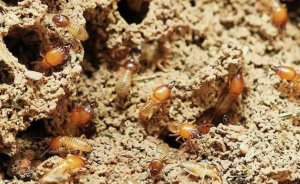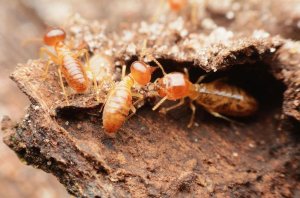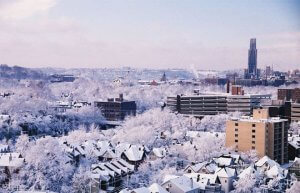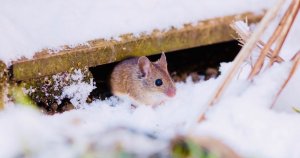While it is sometimes said that good things come in small packages, this is never the case when it comes to termites. Known as the smallest and yet most devastating, wood-destroying insects on the face of the earth, the collective power of a termite colony to ravage entire homes and structures is a force to reckon with.
Due to the fact that termites are so tiny and very quiet once they bore their way inside a home-owner’s walls and wood, they are very difficult to see. For many of Mother Nature’s creatures winter is a time for hibernation, but this is not the case with termites. They remain active all year round, but the colder months of the year do signal some changes in the daily routines of their colones.
Understanding The Termite Colony
A colony of termites works just like a colony of bees in the sense that everything is centered around the queen. It can range in size from only two termites (a king and queen) to a million or more insects. Termites eat every moment they are alive and these highly social insects thrive in subterranean colonies in and around vulnerable structures.

Termites have specific requirements for moisture, and burrowing deeper ensures that these needs will be met while still providing ample access to the wood that they feed upon. Within their community there is a precise division of labor where every insect has a specific task that benefits the colony as a whole. This is very much unlike other insects, such as grasshoppers or roaches, that work only for themselves.
A typical termite colony reproduces via a single pair of reproductive insects, namely, a king and queen, both of which can survive for as long as 15 to 25 years. The specific job of the royal pair concerns the production of pheromones, which are scents that spread throughout the colony and both signal nesting and mating and the prevention of the worker termites from developing into reproductive adults. Depending on the species, a colony will contain several forms or castes, including immature termites, workers, soldiers, nymphs and reproductives.
These castes are distinguished by distinct physical characteristics. Workers usually have soft bodies and are wingless. They are the most visible when the colony is disturbed, and they represent the single largest group found within. Their job is to care for the eggs and immature termites (nymphs), forage for food, feed and groom nest mates and maintain the colony’s foundation.
The soldier caste usually comprises about 1/3 of the colony and their job is to guard against intruders. They are known generally to have darker heads and larger mandibles than workers. It is this division that is responsible for the most damage by eating wood and building tunnels. Reproductives often have darker bodies. The queen is largest in physical size, attaining mass several times that of workers. Her main function is to lay eggs, sometimes as many as thousands in a single day.
Termite Damage To Homes and Property
Termites cause more than $5 billion in property damage every year. To compound their destructive potency is the fact that they often do their damage almost completely unnoticed until it is so far gone that it can create serious challenges for pest-care and pest-management professionals. This is why they have earned the costly nickname of the “silent destroyers.”

At the point of damage discovery, the average homeowner will spend an average of $3,000 for repairs. Costs will vary and depend upon the size, location and accessibility of the infestation as well as the home’s specific construction. Damages can be so extensive that the professionals at Pestco may recommend that a home be demolished.
Facts About Winter Termite Activity
While homeowners may feel like they can relax a little and not worry so much about a destructive termite infestation during the colder months of the year, a false sense of security can be both dangerous and costly. This is because termites are not like other insects, and even though they are certainly not as active as they are in other seasons, they aren’t dormant in winter either. When temperatures drop, termites retreat to their nests to ride out the freezing cold and continue to use underground tunnels to move between nests and buildings.
 Pittsburgh in winter. (Photo: Navin75/Flickr)
Pittsburgh in winter. (Photo: Navin75/Flickr)
Subterranean and Formosan termites go deep underground below the freeze line but tend to remain closer to the surface if winter climes are mild. This is particularly true if termites settle under the foundation of a home, where they have been known to be just as active as they are during the warmer months of the year.
Drywood termites often seek refuge in stumps or trees during the winter which is why these should be removed no matter what season of the year they are discovered.
While outdoor termites are not very active, for those living indoors, it’s party time, especially if they moved inside before the cold weather set in. They can remain active throughout the winter season, feeding on the cellulose of of wooden structures as long as their three major needs are met; namely, wood, water and warmth. This is always at the expense and chagrin of the hapless homeowner who believes there is nothing to worry about until he or she can see green grass and early tulip blooms blooming from a kitchen window.
There are two other important factors that can lure unwanted termites to a property in winter. According to experts at Mississippi State University, piles of firewood can be very problematic. If a homeowner does not keep them away from the exterior of the residence, such piles can easily attract wandering termites seeking shelter.
To avoid termite ingress, firewood should be stored up off the ground and when it is brought inside, should be burned immediately. In addition, those living in regions where the winters are generally milder, (not Pittsburgh, obviously) the risk of winter termite infestations is significantly increased. In those sectors where it rarely freezes, home owners have to take precautions all year round.

7 Helpful Termite Prevention Tips For Your Home
Besides scheduling a professional inspection at least once every 3-5 years by our pest-management and pest-control experts at Pestco Professional Services, to protect residences from termites homeowners should heed the following 7 tips, which come from the National Pest Management Association (NPMA).
Keep Things Dry And Leak-Free
Repair leaking faucets, water pipes and outside air-conditioning units. Maintain well ventilated and dry basements, attics and crawl spaces. Direct water away from the home via properly functioning downspouts, gutters and splash blocks.
Avoid Providing Shelter For Insects
Store firewood at least 20 feet away from the house and 5 inches off the ground. Keep mulch at least 15 inches from the foundation.
Know The Signs Of Infestation
Routinely inspect the home’s foundation for signs of mud tubes (used by termites to reach a food source), cracked or bubbling paint and and/or wood that sounds hollow when tapped. Monitor all exterior areas for any noticeable changes where there is wood, including windows, door-frames and skirting boards. They should also replace weather stripping and loose mortar around basement foundations and windows.
Monitor All Exterior Areas Of Wood
This includes windows, door frames and skirting boards for any noticeable changes. Repair fascia (material covering the ends of rafters), soffits and rotted roof shingles.
Watch Out For Piles of Sawdust
Piles of sawdust are a sure sign that termites have infested a residence. The problem is that by the time these are visible, severe damage usually has been done.
Protect All Wood Surfaces From Soil
Maintain an 18-inch gap between soil and any wood portions of your home.
Consider Termite Prevention A Year Round Issue
Homeowners should be prepared to schedule a professional inspection annually. This is very important because wood-boring insect damage is not covered by most homeowners’ insurance policies.
Pittsburgh Winter Termite Home Treatments
Our technicians at Pestco Professional Services understand that winter is actually one of the best times to implement certain termite treatments, given that the activities and locations of these insects are slightly more predictable.
Our scientists and researchers are consistently at work in our Pittsburgh laboratories studying and researching both the basic biology and behavior of termites via state-of-the-art equipment and tools, and creating products that will not only eliminate infestations, but will also serve to protect homes from their destruction.

According to our very own nationally-recognized, A.C.E. certified expert, Nick Vasko, “Even though many structural infestations are often beyond redemption before they show themselves, there are some professional measures that can be taken. These can include: creating lumber-supporting structures that do not make direct contact with the ground, which can serve to deter termite foraging in the soil, and maintaining lower foundation walls and siding that are clear of vegetation or mulch. This can serve to make inspections for termite shelter tubes easier to detect.”
We understand that no one product ever fits-all strategies, situations and solutions and they only use products that are environmentally friendly and promote a carbon footprint policy that will insure a green planet for future generations.
Our technicians are highly trained and experienced and attend monthly workshops. They also take the time to educate their clients as to what they can do to minimize the risk of returning termites. They welcome questions and offer helpful answers.
In Conclusion
Give our professional pest-care and pest management specialists at Pestco Professional Services a call this winter and give us a chance to design and implement an effective, multi-pronged treatment that will offer any Greater Pittsburgh home owner peace of mind for all the coming seasons of the year — (412) 252-5200.
How Do I Protect My Home From Termites In The Winter?
1) Keep things dry and leak-free. 2) Avoid providing shelter for insects 3) Know the signs of infestation 4) Monitor all exterior areas of wood. 5) Watch out for piles of sawdust. 6) Protect all wood surfaces from soil. 7) Consider termite prevention a year round issue.
 Over 300 Reviews
Over 300 Reviews 